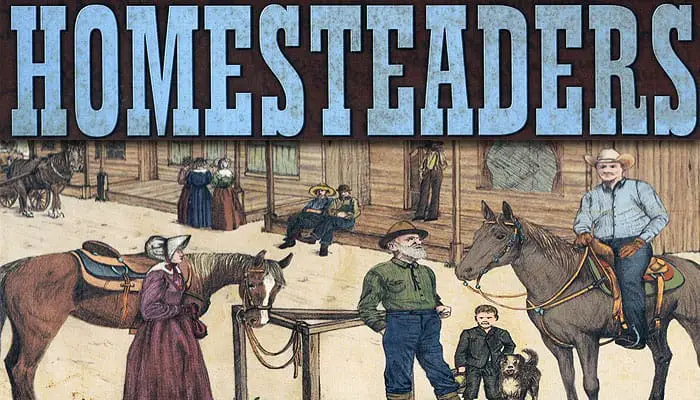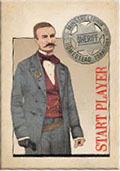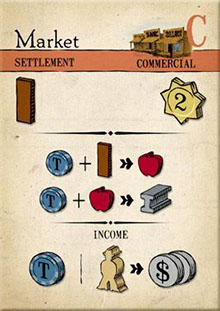
The Homestead Act of1862 allowed Americans to claim undeveloped land by living on and farming it for Jive years. Also in the 1860s, the Transcontinental Railroad was built across North America, linking rail networks between the East and West coasts.
The development of the railroads accelerated the spread of homesteaders colonizing the West and led to the rapid cultivation of new land.
In Homesteaders, players are settlers in the Old West, claiming land to develop into a town. The player who contributes the most to building that town into a city will have the city named after him and be declared the winner.
Components

- 1 Auction board
- 1 Start Player marker
- 1 Auction board
- 4 Player screens
- 4 Market Reference tiles
- 8 Player markers
- 30 Auction tiles
- 36 Debt chits
- 27 Rail Line chits
- 63 Silver coins
- 36 Trade chits
- 51 Victory Point chits
- 53 Building tiles
- 25 Workers
- 74 Resources
Setup
-
Set the Auction board, Resources, Workers, Silver, Trade, Debt, Rail Line, and Point chits within reach of all players.

-
Give each player a player screen, a Homestead tile and matching player markers, 1 Worker, and 6 Silver. Each player places 1 player marker at the start of the Railroad Development track; the other marker is used to bid in the auctions. Put unused player material back in the box.

-
Sort the auction tiles into three piles: 'Auction 1', 'Auction 2' and 'Auction 3'. Order the 'Auction 1' by round number and place them in a pile, FACE UP, on the Auction 1 space. Players may look through this pile.

Sort out the ten 'Auction 2' tiles: Shuffle the two City tiles and place them FACE DOWN on the bottom of this pile. Shuffle the four Town auction tiles and place them FACE DOWN above the City tiles.
Shuffle the four Settlement auction tiles and place them FACE DOWN on top of the Town tiles. Place this auction tile pile on the Auction 2 space. Players may not look at the face down tiles.
For a 4 player game, create a third auction tile pile from the 'Auction 3' tiles in the same manner as for the Auction 2 space. Place this pile on the Auction 3 space. For a 2 or 3 player game, remove these tiles from the game.

-
Sort the buildings and place all of the 'Settlement' and 'Settlement/Town' buildings near the board in the Building Supply. Sort the buildings by type (Residential/Industrial/Commercial).
Place the 'Town' and 'City' buildings in piles aside to be used later. Players may look through these buildings at any time.
For a 2 player game, include only one of each building in the game, except include two of Farm, Market, and Foundry.
-
Randomly choose a player to be the starting player and give them the Start Player marker.

Game Play
Homesteaders is an auction and resource management game in which players bid on land and develop buildings. The game will be played in 10 rounds.
Each round features an income phase, where players acquire resources, and an auction phase, in which players bid for available land and then spend their resources to develop a building on that land. At the end of the game there is a Final Income and Scoring round.
Round Phases
The phases of each round are as follows:
- Setup
- Income
- Auction
1. Setup
At the beginning of each round, players retrieve their bid markers from the auction board, and the top tile of each of the face down auction piles is revealed for this round. Remove old auction tiles from the game.
If it is Round 5, then the Settlement stage is over and the Town stage begins. Remove all unbuilt Settlement buildings from the game and add all of the Town buildings to the Building Supply. Settlement/Town buildings are available in both the Settlement and Town stages. Note that player owned buildings are not removed, only buildings that have not yet been built.
If it is Round 9, then the Town stage is over and the City stage begins. Remove remaining unbuilt buildings from the game and add all of the City buildings to the Building Supply.
2. Income
Allocate Workers
Each player simultaneously allocates their Workers among the available worker slots on their buildings. If a player does not have enough spaces for all of their Workers, then the extras are left idle on their Homestead tile. Players may reallocate all of their Workers every turn.

Note: Some buildings have double worker slots. These require 2 Workers in order to produce the listed resources. For example, two Workers on a river port produce one gold, but one Worker alone produces nothing.
If a player wishes to see how another player will allocate workers first, players should allocate workers in player order beginning with the Start Player.
Collect Income
Each player collects all Automatic income from their buildings and Rail Lines and any Worker income from occupied worker slots. Rail Lines produce an Automatic income of 1 Silver.

It is recommended that each player place their income in plain sight for all to see before placing it behind their screens, so that each player may see what their opponents are receiving.
Pay Workers
Each player must pay 1 Silver to the bank for each Worker on their tiles. A player must pay for all of their Workers, even if some of them are idle.
Players may use the Marketplace, spend Gold, or take Debt if they wish in order to pay their workers. (See Trade and the Marketplace, Spending Gold, and Debt, below).
3. Auction

Bidding
Beginning with the Start Player and continuing clockwise around the table, players take turns making bids on the available auctions or passing.
Players bid by placing their bid token on any available auction, on the space corresponding to their bid. The minimum bid is 3, and all bids must be higher than any opponent's previous bid on that auction.
Note that the available bid values are: 3, 4, 5, 6, 7, 9, 12, 16, and 21. A player may make any bid regardless of cash on hand. If a player is outbid then on their next turn they will either make a new valid bid or pass. If on a player's turn they are currently winning an auction, then they do nothing.
Players must either make a valid bid or pass. If a player has been overbid, then they may rebid in the same auction or on another one, or pass. When each player has either passed, or has the high bid on an auction, the Bidding phase ends.
When a player passes in the auction, they advance their marker on the Railroad Development Track and immediately take the item corresponding to that space or any previous space on the track.

For example, a player advancing to the third space of the Railroad Development Track may take a Trade chit, a Rail Line, or a Worker. Once a player passes their turn is skipped for the rest of the auction.
Because there are more players than auction cards, at least one person will pass each round. It is possible for more than one player to pass during a round if 2 players pass before making any bids.
In this case, each of those 2 or more players advances on the Railroad Development Track. Auction tiles which received no bids are discarded and are not awarded to anyone.
Two Player Game Bidding
Before the start player places their bid token for the round, they also place the neutral bid token on any auction item. The level at which the neutral bid token is placed is determined below. You may want to use a second token to keep track of the neutral bid level.
You can do this on auction space 3 to make it less confusing. Note: The start player is allowed to place the neutral bid token on an item and then overbid it, if desired. They usually will want to place it on the other item however.
The neutral bid token level begins the game at '5'. (On turn 1, the start player will place the neutral token on '5' on one item, and then will make their own bid. Usually a player will choose to bid on the other item, but they may choose to overbid the neutral token if desired.
If both players win an auction item in a round, then the neutral bid level increases by 1 for the next round. So for example, if both players win an item in round 1, then you increase the neutral bid level to 6.
Exception: If the neutral bid token is at '9', it cannot be further increased.
Whenever a player passes decrease the neutral bid token by one level. The minimum the neutral bid level can reach is 3.
If neither player wins auction space #1, then the start player token passes to the other player. If one of the players wins auction space #1, they receive the start player marker as normal.
If the start player begins the round by passing instead of bidding, they still place the neutral bid token on an auction space of their choice. (If the bid level was at '6', they would pass, place the neutral bid token on an item of their choice at a bid of 6, and then reduce the bid level for the future).
Building

Beginning with the player who won Auction 1, and then followed by the winners of Auction 2 and Auction 3, players must pay for the Auction, and then they may build a building of the type listed on the auction tile.
The auction tile is then discarded. Players MAY NOT hold the auction tile for future use. The winner of Auction 1 also receives the Start Player marker. When paying for an auction bid, just as with paying Workers, a player may use the Marketplace, spend Gold or take Debt.
Some auction tiles do not allow building, and instead award Workers and/or advancements on the Railroad Development Track. In this case the player immediately receives these items and then discards the auction tile without building a building.
Some auction tiles award bonus opportunities in addition to a building such as a Worker, or the ability to exchange resources for Victory Points or a Rail Line. These additional items may be taken/paid for AFTER building, and only ONCE. Bonuses acquired for building a building (such as a Trade chit from a Ranch) may be used in paying for the additional items on the auction tile.
To build a building, the player chooses a building from the Building Supply whose type matches their auction tile and pays the cost of that building in resources. The player may buy the necessary resources at the Marketplace.
End of the Game
After the 10th round there is a Final Income and Scoring round in which players repeat the Income phase one final time, and then use the Marketplace as much as they like in order to pay off Debt and convert their Trade chits, Silver, and resources into Victory Points.

Each player calculates their score by adding up the following:
- Victory Point chits collected during the game,
- Point values of their buildings,
- Point values of all bonuses on their buildings.
- 2 Victory Points for each Gold, Livestock, and Copper resource. Wood, Food, and Steel are worth nothing.
Debt chits can be paid off for 5 Silver. Players lose points as a penalty for unpaid debt. The number of Victory Points lost increases the more debt the player has:
- -1 point for the first Debt chit
- -2 Victory Points for the second
- -3 Victory Points for the third, etc...
Five unpaid Debt chits would be worth a total of -15 Victory Points. The player with the most Victory Points will have the city named after them, and be declared the winner!
In case of a tie, the winner is the tied player with the most Silver. If this is also tied, then all tied players win!
Continue Reading
